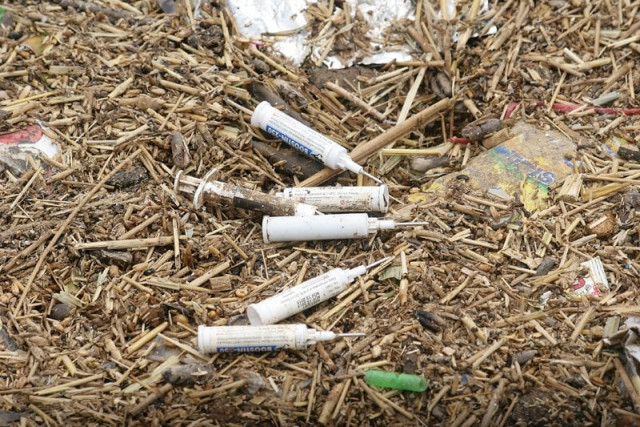Neglected neighbourhood: Cattle dung, hospital waste makes its way to Rehri Goth
Harmful syringes from cattle colony pierce through skin as bare-footed fishermen park boats.

Syringes used for the cattle in Bhains Colony is dumped into the nullah that eventually makes its way into the open sea at Rehri Goth. The residents have suffered several piercing and take more than two months to recover. PHOTO: ATHAR KHAN/EXPRESS
As garbage from Bhains Colony gets thrown into the water untreated, Rehri Goth has become dumping ground for not only cattle dung, but also injections, syringes and other factory waste.
One of the last villages of the Rehri Goth union council, Latt Basti, wears a perpetual unpleasant odour for the same reason. There is a 'fountain' of mud-like rubbish falling from the hill as the garbage is dumped from city's biggest cattle colony.
The factories located along the nullah are also disposing their untreated waste, syringes and injections into the sea, and the water that passes right in front of the fishermen's houses. Hundreds of used injections are seen near the boats and the streets of the village. The residents are used to both - the stink and harmful syringes.
Anwar Shah, while sitting with his friend and enjoying his afternoon meal near the nullah, says the garbage has made their life very uncomfortable. "It is not a new issue," he adds. "I have been seeing the same dirt coming from Bhains Colony since my childhood."

His friend Suleman Jatt accepts that they don't find the odour as unpleasant as an outsider does. "The smell is part of our life," he says. "This is the only dreadful thing in our life. The intensity of the smell sometimes doubles and people feel headaches." For someone sitting outside a makeshift hut with little to no infrastructure, it is surprising that he finds the smell to be their only problem.
The wasted syringes are mostly uncapped and highly dangerous for the residents. Akram Jatt is one of the young fishermen who experienced the pain of one such injection last year. "I was pushing my boat and felt something pierce into my foot," he recalls. "I cried with pain and was rescued by my fellows." It took him nearly two months to recover.
For the children wading through the waters, collecting syringes and vials have become part of their childhood games. Mehboob Jat, a young boy, shows off the syringes he and other boys play with. "Our elders stop us from playing with the syringes but we still do it," the boy informs proudly before he jumps into a puddle and runs away.
Asif Jatt, a fisherman, has another complaint that the garbage has ruined his boat. "It is poisonous for my boat," he says as he throws his chappal into the boat. "I have to take extra care for my boat and for my bare feet."
His friend, Abdul Ghafoor, cries out to him to be careful. "Not hundreds but thousands of syringes are present in the mud," he shouts.
A majority of the residents of Rehri Goth, including those of Latt Basti, migrated from Keti Bunder when freshwater from the Indus River stopped coming to them. "Here, we at least have freshwater," says an elderly man, Babu Baloch. "But the dirt is irritating."
Dr Mohan Lal Malhi, a veterinary doctor in Bhains Colony, admits there is no mechanism to dump animal-related trash, including their medicines and dung. "As such, there are no side-effects if it [syringes] pierces into one's body," he adds.
According to Dr Malhi's rough estimates, around 400,000 animals are living in Quaidabad and its surrounding areas. The city, in total, has at least over one million animals.
"Who cares about the trash of the cattle in this city," Dr Masroor Pirzado, another veterinary doctor asks. "If one cares, they won't be able to sleep after visiting Latt Basti."
Several industrial units in the area also dump their waste into this nullah, says Talib Kutchi, a representative of the Pakistan Fisherfolk Forum. "People like to visit coastal sites and here we ruin them with such activities," he complains. "Our flora and fauna are also at risk. This kind of waste going directly into the sea is against the rights of fishermen who solely depend on sea resources."
Published in The Express Tribune, June 21st, 2014.



















COMMENTS
Comments are moderated and generally will be posted if they are on-topic and not abusive.
For more information, please see our Comments FAQ